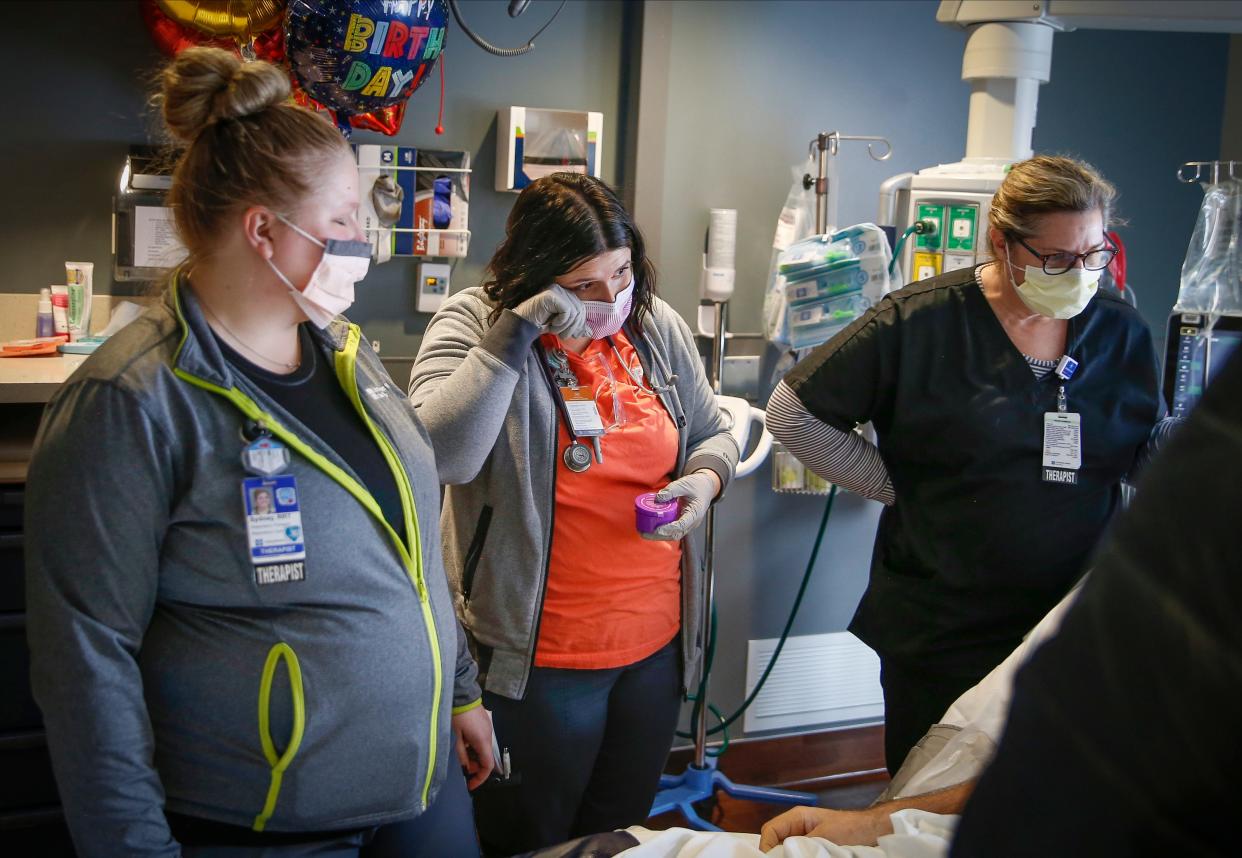Editorial: With COVID-19 straining hospitals and schools, we all can do something to help
The suffering from COVID-19 never stopped. But its visibility might never have been greater than it is now, even considering the disease's early rampages overseas and on the U.S. coasts and during the winter 2020-21 surge.
For practical purposes, the door slammed shut about a year ago for any significant government intervention in Iowa, when Gov. Kim Reynolds signed a law requiring full-time in-person schooling and a few days later allowed some limited mask-wearing requirements to expire. The Biden administration, also a year old now, has fallen short of expectations for both compassion and competence, expectations born from candidate Joe Biden's promises for sufficient testing and personal protective equipment.
Fine. Let's leave knock-down drag-outs over mandates behind. Choices remain available at the community and individual levels for Iowans who want to at least try through their own simple actions to alleviate suffering from the fast-spreading omicron variant.
The need is urgent.
Hospital leaders and workers say the numbers of patients and sicknesses among their staff have created alarming challenges. “We’re in a critical moment here in Iowa over the next four weeks,” Suresh Gunasekaran, CEO of University of Iowa Hospitals, said Jan. 13. Kelly Garcia, who leads the Iowa Department of Public Health, said Iowans should take steps to slow the spread.
The number of Iowans hospitalized with COVID-19 was 957 as of Friday. Only for about a month since the start of the pandemic has it been higher. The number of state-monitored positive tests has never been higher.

More: How two respiratory therapists push on during omicron crush
A southern Iowa school district, Mount Ayr, has called off classes for at least three days because of sick students and staff. Masks will be required for at least a couple of weeks. This isn't the work of some rogue superintendent — county public health officials asked for assistance because of the strain on medical services. Ottumwa canceled school Friday because of illness, without specifically citing COVID-19.
Pictures of long lines at COVID-19 testing sites have become a social media staple. The federal government is finally letting Americans request delivery of at-home tests, although the turnaround time for shipping and a rigid four-tests-per-street-address ceiling will greatly restrict the overdue initiative's usefulness.
What can we do?
Wear high-quality masks in public spaces, and share extras with people who can't procure them. We have the rest of our lives for examination and recrimination related to the evolution of advice on masks and the evidence for their efficacy. We know, and have always known, that they can reduce transmission and are for most people a minimal burden. Invest in preserving lives and the stability of the health care system, either through buying them online or setting aside time for a trip (as soon as later this week)to certain health facilities and pharmacies for free N95 masks from the White House. Peer pressure tends to make mask wearing contagious — help make it the norm, for now, at Iowa schools, workplaces and other gathering places.
Eight days after @POTUS announced 400M free masks, we're rolling at Hy-Vee in West Des Moines.
President Biden delivers. pic.twitter.com/swx3KLqYjo— Ben Wakana (@benwakana46) January 22, 2022
Stay home if you're sick, and enable people to stay home (for themselves or with their children) if you're an employer. This is oft-repeated advice, but it's tied to the all-too-common problem of people working sick and children being sent to school sick, often because of lack of alternatives. Don't take chances on whether symptoms could be COVID-19 or something more benign. Nobody likes having their plans for the day blown up at 6 a.m. by symptoms of illness in themselves or a child or colleague. But even worse are extended school closings, waiting for care at overcrowded emergency rooms, or planning funerals.
Default to kindness. People are on edge for all sorts of reasons. Maybe those reasons are tied to the pandemic and maybe not. A presumption that villainizes anybody who reaches different conclusions about risk and behavior isn't helpful — especially if you believe disinformation helped bring them there. Let's save scorn and labels for the truly malicious actors without reflexively calling our neighbors callous or authoritarian or sheep, and instead look for ways to help even those whose choices we don't support.
This is perhaps the most taxing stage of the pandemic for many Iowans, especially health care workers and educators. Let's all do anything we can, however small, that might help even a little bit.
This editorial is the opinion of the Des Moines Register's editorial board: Carol Hunter, executive editor; Lucas Grundmeier, opinion editor; and Richard Doak and Rox Laird, editorial board members.
Want more opinions? Read other perspectives with our free newsletter, follow us on Facebook or visit us at DesMoinesRegister.com/Opinion. Respond to any opinion by submitting a Letter to the Editor at DesMoinesRegister.com/Letters.
This article originally appeared on Des Moines Register: Opinion: As omicron variant rips through Iowa, we all can pitch in
